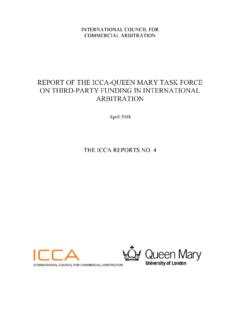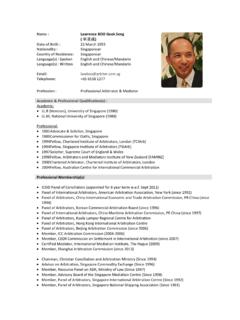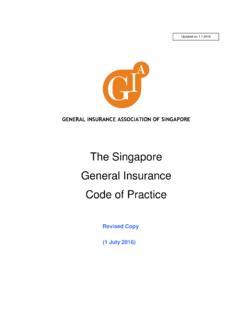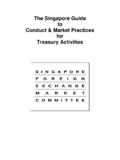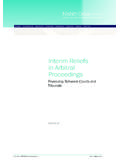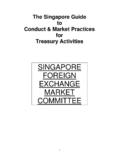Transcription of Corruption in Arbitration Law and Reality
1 I Corruption in Arbitration Law and Reality * Michael Hwang ** and Kevin Lim** _____ CONTENTS I. Introduction: Context, Definitions, and Issues Considered .. 1 II. The Tribunal s Right and Obligation to Inquire into Corruption Sua Sponte .. 8 III. The Burden of Proving Corruption and the Requisite Standard of Proof .. 14 IV. Determining the Law Governing the Elements and Legal Consequences of Corruption : Conflict of Laws Analysis in Relation to Intermediary Agreements .. 25 A. The Applicable Conflict of Laws Rules in international Arbitration .. 30 B. Conflict of Laws Considerations Determining Whether the Law of the Place of Performance or the Seat of Arbitration Overrides the Parties Chosen Law.
2 32 (i) Law of the Place of Performance .. 32 (ii) Law of the Arbitral Seat .. 39 C. The Relevance of Transnational Public Policy in Conflict of Laws Analysis .. 41 V. The Legal Consequences of a Finding of Corruption .. 42 A. The Tribunal s Jurisdiction and the Arbitrability of Issues of Corruption .. 43 B. The Admissibility and the Merits of the Claim .. 44 VI. Whether Arbitrators have a Duty or the Right to Report their Suspicions of Parties Corrupt Activities to the Authorities .. 47 VII. The Judicial Scrutiny of Corruption -Tainted Arbitral Awards at the Setting Aside and Enforcement Stages.
3 50 * This article is an expanded version of a paper of the same title presented at the Herbert Smith-SMU Asian Arbitration Lecture on 4 August 2011 in Singapore. It is uploaded on the international Council for Commercial Arbitration (ICCA) website with kind permission of the Asian international Arbitration Journal (AIAJ), at the request of the National University of Singapore s Willem C. Vis international Commercial Arbitration Moot Team (2011-2012). This article remains unedited; its final version is due to be published in the AIAJ in May 2012.
4 The authors express their appreciation to Constantine Partasides, Dr Richard Kreindler, Dr Stephan Wilske, Hansel Pham, Carolyn Lamm, Dr Pierre Karrer, Dr Mohamed Abdel Raouf, and Thong Chee Kun, for kindly extending to the authors copies of their previous works on the subject of Corruption in Arbitration , and/or providing assistance on related questions of law, which were of immense value in the preparation of this article. The authors would also like to thank Professor Yeo Tiong Min, Dr Anne-Catherine Hahn, and Professor Catherine Kessedjian for their invaluable comments on an earlier draft of this article.
5 However, the views expressed herein, as well as any errors and omissions, are the authors own. ** BCL, MA (Oxon); Senior Counsel and Chartered Arbitrator, Singapore. ** LLB (Hons) (National University of Singapore); Associate, Michael Hwang Chambers. ii A. The Competing Considerations: Balancing the Finality of Arbitral Awards and the Forum s Fundamental Public Policy Concerns .. 51 B. The Competing Judicial Attitudes Regarding the Permissible Extent of Court Review of Tribunals Findings of Fact and Law .. 52 (i) Minimal Review .. 52 (ii) Maximal Review .. 58 (iii) Contextual 65 C.
6 The Public Policy Ground for Setting Aside or Refusal to Enforce a Corruption -Tainted Arbitral Award .. 68 (i) Two Classes of Public Policy: Domestic Public Policy and international Public Policy68 (ii) Whether Corruption Violates international Public Policy .. 70 (iii) Whether Contracts for the Sale of Influence Violate international Public Policy .. 72 D. The Appropriate Standard of Review .. 73 (i) The Weakness of the Minimal Standard of Review .. 73 (ii) The Superiority of the Contextual Standard of Review .. 75 (iii) The Standard of Review Applied by Minimal Review Courts in Reality : A Hark Back to Contextual Review?
7 78 VIII. Conclusion .. 81 _____ 1 I. Introduction: Context, Definitions, and Issues Considered 1. Corruption in international business is rife, and growing worse. On a scale from 0 (highly corrupt) to 10 (very clean), nearly three quarters of the 178 countries assessed in Transparency international s1 Corruption Perceptions Index 20102 scored below five. Corruption levels around the world are perceived to have increased over the past three The scale of bribery in business today is described as staggering, and its consequences dramatic: 4 The scale and scope of bribery in business is staggering.
8 Nearly two in five polled business executives have been asked to pay a bribe when dealing with public institutions. Half estimated that Corruption raised project costs by at least 10 per cent. One in five claimed to have lost business because of bribes by a competitor. More than a third felt that Corruption is getting worse. The consequences are dramatic. In developing and transition countries alone, corrupt politicians and government officials receive bribes believed to total between US$20 and 40 billion annually the equivalent of some 20 to 40 per cent of official development assistance.
9 The cost is measurable in more than money. When Corruption allows reckless companies to disregard the law, the consequences range from water shortages in Spain, exploitative work conditions in China or illegal logging in Indonesia to unsafe medicines in Nigeria and poorly constructed buildings in Turkey that collapse with deadly consequences. 5 2. It should therefore come as little surprise to anyone that Corruption is internationally abhorred and vigorously There is a global convergence of legal rules, authorities, and opinions 1 A global civil society organization concerned with combating Corruption , raising awareness of its damaging effects, and developing measures to tackle it.
10 2 The 2010 Corruption Perceptions Index measures the perceived levels of public sector Corruption in 178 countries around the world by drawing on different assessments and business opinion surveys carried out by independent and reputable institutions : see < > and the 2010 Corruption Perceptions Index Report. 3 The 2010 Global Corruption Barometer. 4 See also Bernardo Cremades and David Cairns, Transnational public policy in international arbitral decision-making: The cases of bribery, money laundering and fraud in Kristine Karsten and Andrew Berkeley, Arbitration , Money Laundering, Corruption and Fraud, Dossiers- ICC Institute of World Business Law (September 2003) 65 at pp.

